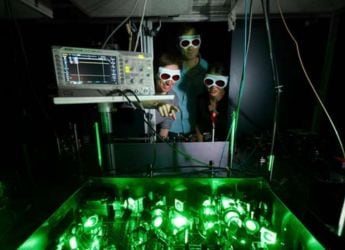- Home
- Science
- Science News
- Scientists to Harness the Sun to Break Down Plastic
Scientists to Harness the Sun to Break Down Plastic
Researchers mixed plastic with chemicals to form a solution, which could then be broken down by artificial sunlight.

The plastic was broken down in six days by the researchers
Scientists said Wednesday they have come up with an environmentally-friendly method that uses artificial sunlight to transform plastic into power-generating chemicals, as countries worldwide battle to reduce waste. Huge quantities of plastic have piled up on land and been dumped in the sea across the world, with Asian nations in particular facing criticism for failing to tackle the problem.
Researchers in Singapore say they have converted plastic into "formic acid", which can be used in power plants to generate electricity, by using a catalyst which neither damages the environment nor costs a lot of money.
In lab experiments, researchers from the city's Nanyang Technological University mixed plastic with chemicals to form a solution, which could then be broken down by artificial sunlight.
The plastic was broken down in six days, and scientists hope the process can be carried out in future under real sunlight.
"We are able to turn plastics, which are of course polluting the oceans, into useful chemicals," said Soo Han Sen, who led the two-year research project and is from NTU's School of Physical and Mathematical Sciences.
"We're hoping to turn this into a fully renewable process that's carbon neutral."
Other methods of recycling plastic typically require it to be melted down using fossil fuels, which produce climate-damaging greenhouse gases.
But so far only tiny amounts of plastic have been converted into formic acid, and Soo conceded there are challenges to replicating the process on a bigger scale.
More manpower and funding were needed to develop it, and so far scientists had tested it only on pieces of pure plastic, and not waste.
Catch the latest from the Consumer Electronics Show on Gadgets 360, at our CES 2026 hub.
Related Stories
- Samsung Galaxy Unpacked 2025
- ChatGPT
- Redmi Note 14 Pro+
- iPhone 16
- Apple Vision Pro
- Oneplus 12
- OnePlus Nord CE 3 Lite 5G
- iPhone 13
- Xiaomi 14 Pro
- Oppo Find N3
- Tecno Spark Go (2023)
- Realme V30
- Best Phones Under 25000
- Samsung Galaxy S24 Series
- Cryptocurrency
- iQoo 12
- Samsung Galaxy S24 Ultra
- Giottus
- Samsung Galaxy Z Flip 5
- Apple 'Scary Fast'
- Housefull 5
- GoPro Hero 12 Black Review
- Invincible Season 2
- JioGlass
- HD Ready TV
- Laptop Under 50000
- Smartwatch Under 10000
- Latest Mobile Phones
- Compare Phones
- Red Magic 11 Air
- Honor Magic 8 RSR Porsche Design
- Honor Magic 8 Pro Air
- Infinix Note Edge
- Lava Blaze Duo 3
- Tecno Spark Go 3
- iQOO Z11 Turbo
- OPPO A6c
- Lenovo Yoga Slim 7x (2025)
- Lenovo Yoga Slim 7a
- Lenovo Idea Tab Plus
- Realme Pad 3
- Moto Watch
- Garmin Quatix 8 Pro
- Haier H5E Series
- Acerpure Nitro Z Series 100-inch QLED TV
- Asus ROG Ally
- Nintendo Switch Lite
- Haier 1.6 Ton 5 Star Inverter Split AC (HSU19G-MZAID5BN-INV)
- Haier 1.6 Ton 5 Star Inverter Split AC (HSU19G-MZAIM5BN-INV)







![[Sponsored] Haier C90 OLED TV | Dolby Vision IQ, 144Hz OLED and Google TV in Action](https://www.gadgets360.com/static/mobile/images/spacer.png)









